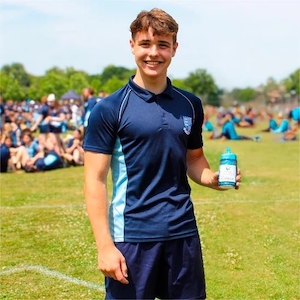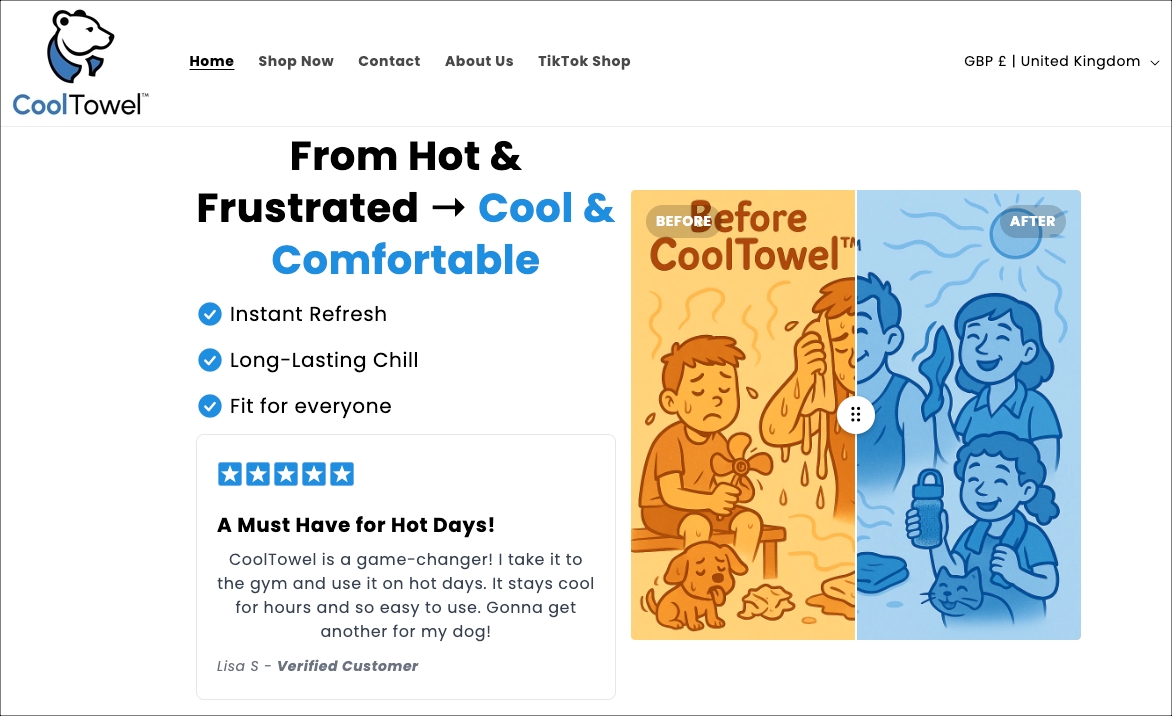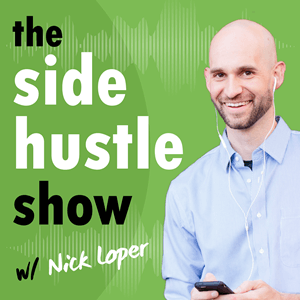
What if you could turn a teenage sports annoyance into a $100k business while juggling school, sports, and everything else that comes with being 15?
Harrison Nott has done exactly that. Starting at just 13 years old, Harrison built CoolTowel into a business projected to hit £100,000 (about $130,000) in revenue this summer alone.
The spark came from a simple problem: getting overheated and uncomfortable while playing squash. Harrison saw an opportunity in the cooling towel market that barely existed 3 years ago.
Tune in to Episode 696 of the Side Hustle Show to learn:
- The viral video strategies that drove Harrison’s first million views
- How user-generated content campaigns can scale an e-commerce business
- Why personal branding matters more than ever for young entrepreneurs
Sponsors
- Mint Mobile — Cut your wireless bill to $15 a month!
- Indeed – Start hiring NOW with a $75 sponsored job credit to upgrade your job post!
- OpenPhone — Get 20% off of your first 6 months!
- Shopify — Sign up for a $1 per month trial!
- Policygenius — Compare free life insurance quotes from top companies and see how much you could save.
The Birth of CoolTowel: From Grandma’s Sewing Machine to Alibaba
Harrison’s been running businesses since age 8, starting with reselling on eBay. By 13, he had already launched and failed at 10 different ventures, learning crucial lessons along the way.
The cooling towel idea came from pure frustration. Air conditioning was expensive, fans just pushed hot air around, and cooling towels weren’t really a “thing” yet in 2022.
His first prototype was charmingly DIY: Harrison’s grandmother brought over her sewing machine, and together they sewed a microfiber towel around an ice pack. It didn’t work, but it proved the concept had potential.
That’s when Harrison turned to Alibaba to find a manufacturer. The key was his prior experience negotiating with suppliers and building trust. Most manufacturers want 500-1,000 unit minimums, but Harrison successfully negotiated down to just 50 units at £3 each.

Harrison’s tip: Manufacturers are more likely to work with smaller orders if you’ve used the platform before and can demonstrate you’re serious about scaling up over time.
Building the Brand: Why Packaging Beats Product
While anyone can source cooling towels from China, Harrison focused heavily on branding from day one. He designed his own packaging, complete with a polar bear mascot, because he understood something crucial: “At the end of the day, there are similar products out there, but for the CoolTowel to sell, it needs to show what it does and how to use it.”

Premium packaging allowed him to:
- Sell for higher prices (£8-10 vs generic alternatives)
- Build customer trust and reduce returns
- Create a clear path for scaling up
The brand positioning was simple but effective: “No batteries, no chemicals, just science that works. You wet it, ring it out, and snap it to feel cooler in seconds.”
The Viral Video Strategy: 50 Swings to Success
Harrison didn’t get lucky with his first video. He posted about 50 videos on TikTok before his first one properly took off, gaining over a million views.
https://www.tiktok.com/@cooltoweltiktok/video/7392644261793123617
His approach was methodical:
Study successful formats: Harrison analyzed viral dropshipping videos and took inspiration from trending sounds and controversial hooks, adapting them for cooling towels.
Target different pain points: Some videos focused on gym use, others on menopause, outdoor work, or general overheating. He tested multiple angles to see what resonated.
Keep iterating: The 15th video got 30,000-50,000 views, but the real breakout came around video 30-40.
The winning formula combined trending sounds with controversial hooks that targeted specific pain points. Harrison made the cooling towel relevant by finding angles that made people stop scrolling.
Most people give up after 5-10 failed attempts. Harrison’s persistence through 50 videos before his breakthrough shows the importance of treating content creation like a numbers game.
From Organic to Paid: Scaling with User-Generated Content
While organic content built the foundation, Harrison knew he needed predictable growth. He transitioned to a sophisticated user-generated content (UGC) strategy using TikTok Shop’s built-in affiliate system.
Here’s how he scaled his creator network:
- Smart filtering: Harrison only messaged creators who had sold at least £100 worth of products in the last 30 days, ensuring they had proven sales ability.
- Performance-based offers: He offered free samples and 20% commission on sales. This kept costs low while attracting serious creators.
- Automation tools: He uses Reacher AI to automatically send personalized messages to thousands of potential affiliates, though he notes this only works once you have an established brand.
The cold message template: “Hey [Creator Name], I hope you’re well. I’m reaching out from CoolTowel, a trademarked family-owned brand with over 11,000 sales on TikTok Shop and hundreds of five-star reviews. We’ve built a movement around cooling towels, helping athletes, parents, menopausal women, pet owners and outdoor workers beat the heat naturally… You can earn a 20% commission and we’d love to send you out a free sample so you can try it out first.”
Harrison sent out around 800-1,000 free samples. While most creators didn’t deliver sales, some generated over £15,000 in revenue from a single video. It’s a classic “venture capitalist” approach — most investments fail, but the winners more than cover the losses.
The Hidden Costs of E-Commerce Success
Harrison is refreshingly honest about the financial realities. While projecting £100,000 in revenue, his actual profit margins are around 20% after all costs:
- 10% TikTok Shop fee
- 20% income tax
- 20% VAT
- Ad spend (when not organic)
- 20% affiliate commissions
- Software subscriptions
- Product costs
The cash flow challenge: TikTok Shop takes two months from order to payment, creating serious cash flow issues. Harrison spent half the summer with no money because every penny was tied up in inventory cycles.
This cash flow crunch is common in physical product businesses, where even successful entrepreneurs can struggle to fund growth.
Tools and Tech Stack
Harrison keeps his tech stack simple but effective:
- Canva for all packaging and marketing materials
- ChatGPT for customer service automation, website layouts, and time-consuming tasks
- Reacher AI for automated affiliate recruitment
- Shopify (though he primarily sells through TikTok Shop)
- Fiverr for tasks he can’t handle himself
Harrison’s AI tip: “To get the output you want, you have to give a good input… You can’t just say a couple words – it’s got to be a good foundation.”
The Inventory Nightmare: Lessons from a £10,000 Loss
Not everything went smoothly. Harrison’s biggest setback came when a viral video generated 2,000 orders, but his inventory got stuck in customs for two weeks. TikTok Shop automatically cancelled the orders, and Harrison lost:
- £10,000 in lost sales
- Affiliate commissions he still had to pay
- Ad spend with no return
- Damage to his brand reputation from negative reviews
This experience taught him crucial lessons about inventory management and the importance of having backup plans for supply chain disruptions.
The Personal Brand Breakthrough
Two months ago, Harrison shifted strategy to include personal branding videos showing himself packing orders and sharing his entrepreneurial story.
https://www.tiktok.com/@harrisonnott/video/7516578568634174742
This move led to:
- Multiple videos with 4+ million views
- An all-expenses-paid invitation to Alibaba’s co-create events in Las Vegas and London
- Networking opportunities with successful entrepreneurs offering free mentorship
- A partnership with a pet company to develop a dog cooling towel
“I think a lot of my sales have been because people like to support real businesses and ones that aren’t just AI,” Harrison explains. In an increasingly automated world, the human element becomes a competitive advantage.
Scaling Challenges: From Bedroom to Business
Harrison still fulfills most orders from his bedroom, bringing in friends and family for big shipping days. His biggest single day generated £25,000 in revenue (about 2,000 towels), requiring an army of helpers and his dad’s warehouse space.
While he could use third-party logistics (3PL), Harrison chooses to self-fulfill because:
- He enjoys the process
- It creates authentic content opportunities
- Customers appreciate the personal touch
- It keeps overhead costs low
Harrison is exploring wholesale opportunities with sports shops and hotels, plus expanding internationally beyond the UK’s four-month hot weather window.
What’s Next?
Harrison’s vision extends beyond CoolTowel:
Product expansion: Cooling headbands, pet products, different colors and packaging
Geographic expansion: International sales, particularly targeting year-round hot climates
Channel diversification: Amazon (currently getting 1-2 sales daily), retail partnerships
Personal brand growth: Teaching entrepreneurship and helping others build businesses
“I think in the future I’d like to help people create businesses. I’d like to help people learn about entrepreneurship,” Harrison says.
What’s Different About Gen Z Entrepreneurs
Harrison represents a new breed of young entrepreneurs who:
- Start with low overhead and bootstrap growth
- Leverage social media as their primary marketing channel
- Build personal brands alongside product brands
- Use AI tools to automate routine tasks
- Prioritize authentic connections over polished corporate messaging
His success highlights the importance of finding emerging trends and building businesses around them before they become saturated.
Harrison’s #1 Tip for Side Hustle Nation
“Don’t give up. If it were easy, everyone would be doing it.”
Episode Links
- CoolTowel
- Reselling on eBay
- Alibaba
- $0 – $10K/Month At 14 Years Old | My Business Journey
- Dropshipping
- User-generated content (UGC)
- Canva
- ChatGPT
- Reacher AI
- Shopify
- Fiverr
Looking for More Side Hustle Help?
- Start Your Free $500 Challenge. My free 5-day email course shows you how to add $500 to your bottom line.
- Join the free Side Hustle Nation Community. The free Facebook group is the best place to connect with other side hustlers and get your questions answered.
- Download The Side Hustle Show. My free podcast shares how to make extra money with actionable weekly episodes.















